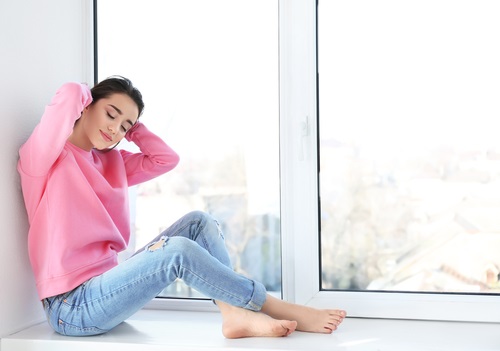How To Naturally Reduce Anxiety At Home
Do you remember what you felt during your first day of high school? What about the jitters before your first ever job interview, or that first date? That feeling of worry and apprehension that stems from not knowing what’s about to happen next is called anxiety.

Anxiety in a nutshell
Everyone becomes anxious at some point in his or her life. In fact, occasional anxiety is healthy — as it is your body’s natural response to stress. It warns you of possible danger and prompts you to take much-needed precautions to avoid uncalculated risks. However, severe anxiety can be detrimental to your judgment and decision-making skills. Overall, it can do you more harm than good.
Fortunately, there are natural remedies that you can do at home to help relieve your anxiety:
Chamomile
Drink a cup of chamomile tea to help calm your nerves. Chamomile itself is famous for its numerous uses in traditional and modern medicine. Aside from its anti-inflammatory properties, chamomile essential oils have calming effects that can soothe your nerves — similar to the effects of a mild tranquilizer. Chamomile tea has also been widely used as a sleep-inducer to treat patients with insomnia.
Studies have revealed that consuming chamomile extracts has modest anti-anxiety effects for patients who have mild to moderate generalized anxiety disorder (GAD). You can also use dried chamomile for aromatherapy and enjoy its relaxing effects.
Sleep
If you suffer from a sleep disorder like insomnia, you are more prone to anxiety attacks. Similarly, inducing sleep is hardest when you have a lot of thoughts running through your head.
Before going to sleep, practice deep breathing exercises to calm your nerves. Additionally, here are some useful tips that you can follow to make your room more conducive for sleeping:
- Dim the lights and close your curtains.
- Keep your room free from distractions and sources of noise.
- Stay away from sources of blue light like computers and cellular phones.
- Adjust your room temperature to a level of comfort.
- Play classical music.

Meditate
You can start a meditation practice by eliminating irrational and chaotic thoughts to achieve a sense of calm, clarity, and inner peace. People who suffer from anxiety disorders are encouraged to practice stress management techniques like meditation to further supplement the benefits of therapy. John’s Hopkins researchers suggest that you allot 30 minutes of your time every day for mindfulness meditation as it can help relieve anxiety symptoms and improve your stress management. Here are the steps to basic mindfulness meditation that you can follow:
- Find a quiet place in your house that’s away from distractions.
- Sit on a chair with your back straight, or on the floor with your legs crossed in front of you.
Close your eyes and focus on your breathing, feel the air flowing into your nostrils, out of your mouth, and the rise and fall of your chest. - After you’ve narrowed your concentration, slowly ease your conscious thoughts out and widen your awareness to sensation, scent, sounds, and ideas.
- Focus on each of these without passing any judgment. If your heart and mind start racing, go back to your breathing before widening your focus again.
Exercise
Exercise has a long list of benefits for your physical and mental wellbeing. Being physically active can reduce your risk of developing lifestyle diseases such as hypertension, kidney disease, and diabetes. Living an active lifestyle also helps your brain cope better with stress.
Research shows that doing aerobic exercise can help ease anxiety symptoms in patients with anxiety disorders. When you exercise, your body releases feel-good hormones, known as endorphins, that give your body a positive feeling similar to the effects of morphine. You only need 5 minutes of aerobic exercise to enjoy its anti-anxiety benefits.
Brisk walk
If you don’t have an active lifestyle or you are not in the mood to sweat it out in the gym, you can simply take a 10-minute brisk walk to relieve your anxiety. Psychologists agree that when it comes to treating anxiety, the benefits of having a 10-minute brisk walk is equal to doing a 45-minute workout.
When to seek help
Anxiety is normal when facing uncomfortable and unfamiliar circumstances. If your anxiety persists even after following these remedies, or if it gets worse over time and starts to interfere with your daily routine, you might consider seeking the help of a trained psychologist, like those at Endeavour Wellness.
Globally, 1 in every 13 people suffers from anxiety disorders. Since there are various types of anxiety disorders that might disrupt your daily activities and overall well-being, early detection can pave the way to early resolution. You can also take solace in the fact that even if you do suffer from anxiety, there are natural remedies that you can benefit from — and they can be found in the comfort of your home.
Shared on Simple Homestead Blog Hop!

Pingback: Can Natural Remedies Replace Your Prescriptions?
Hi!
This article is really interesting and well detailed. Anxiety is a serious matter. We need to reduce it. And I think reducing it naturally is very important. We are also very concerned about that topic.
Hi Jane,
I agree that anxiety is a very serious matter and learning how to naturally reduce it can take some trial error, but it is well worth to be able to feel good again. Thanks for stopping by and commenting.
Pingback: How to Deal With Xanax Addiction: Some Natural Alternatives